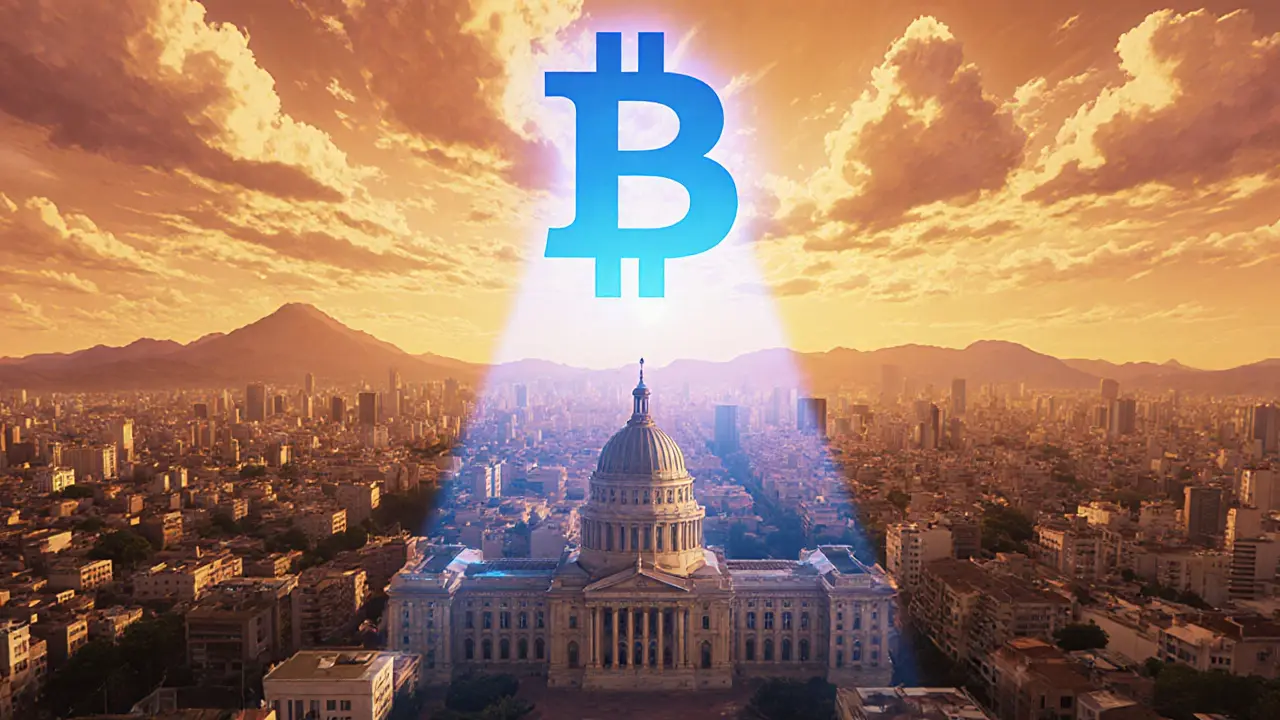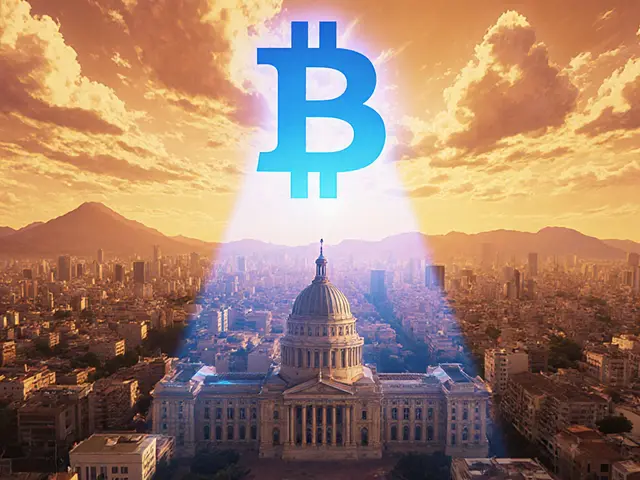Bitcoin Payment Cost Calculator
Calculate Your Bitcoin Payment Impact
Based on El Salvador's experience, this tool shows estimated costs for accepting Bitcoin as legal tender compared to traditional payments.
Your Transaction Details
Conversion Details
Monthly Cost Impact
Total Conversion Loss: $0.00
Based on 3.2% average conversion rate loss per transaction
Remittance Savings
Estimated Monthly Savings: $0.00
Based on 2% reduction in remittance fees
El Salvador's Bitcoin legal tender law is the world’s first statute that makes a decentralized digital currency an official medium of payment alongside the U.S. dollar. Enacted on June92021 and activated on September72021, the law forces every economic agent to accept Bitcoin legal tender when offered. The move sent shockwaves through central banks, regulators, and crypto enthusiasts, spawning a cascade of praise, skepticism, and policy analysis.
What the law actually requires
The legislation is built around Article7, which obliges merchants, service providers, and public entities to accept Bitcoin for any transaction, from a cup of coffee to tax payments. In practice, the government created an automatic conversion engine that swaps Bitcoin for U.S. dollars at the prevailing market rate, keeping accounting standards in dollars while allowing payments in the crypto asset.
Building a dual‑currency system
To keep the economy stable, ElSalvador retained the U.S. dollar as the reference currency. A new mobile app, the Chivo Wallet, distributes a one‑time $30‑equivalent Bitcoin bonus to every citizen and promises zero‑fee conversions. The government also capped the total Bitcoin supply at the network’s 21million limit, arguing that the cap prevents inflation.
Despite the technological novelty, the dual system creates friction. A 2023 NBER working paper found that 88% of merchants instantly convert received Bitcoin into dollars, indicating limited confidence in holding the cryptocurrency.
International monetary authorities weigh in
Global institutions reacted with a chorus of caution. The International Monetary Fund warned that the policy could expose the country to "severe financial instability" and urged a review of the legal tender provisions. Other central banks echoed the sentiment, pointing out the volatility of Bitcoin compared with traditional fiat or emerging central bank digital currencies (CBDCs) that many nations are piloting.
Legal scholars question forced tender
Beyond economics, the law sparked a constitutional debate. Dr. Dror Goldberg, a specialist in compulsory tender history, argues that forcing Bitcoin acceptance infringes on freedom of contract and property rights. In most jurisdictions, merchants can legally refuse cash if they display a "no‑cash" sign; the Salvadoran law flips that principle on its head by mandating acceptance of a volatile digital asset.

Crypto community’s hype vs reality
Within the cryptocurrency world, the experiment was hailed as a historic validation of Bitcoin’s utility. Influencers and venture capitalists claimed it would trigger a cascade of similar adoptions, especially in cash‑poor economies. Yet the data tells a more nuanced story. While half of households initially downloaded the Chivo Wallet, only 5% of all retail sales were settled in Bitcoin by mid‑2022, and active users were predominantly young, educated males-not the unbanked demographic the policy sought to empower.
Adoption data on the ground
- ~50% of households downloaded the wallet in the first month.
- ~60% of early downloaders never made a second transaction after using the bonus.
- Only ~20% of merchants regularly accept Bitcoin, and most of those convert it to dollars immediately.
- Average Bitcoin‑to‑dollar conversion rate loss for merchants: 3.2% per transaction (due to spread and price volatility).
- Remittance savings claimed by the government are modest; a 2024 study estimated a 2% reduction in fees compared with traditional providers.
What the experiment means for other countries
Developing nations watching ElSalvador wonder whether Bitcoin can solve inflation, remittance costs, and financial exclusion. The mixed outcomes suggest a more cautious approach. Countries experimenting with CBDCs retain sovereign control over monetary policy and can program features like conditional transfers, while Bitcoin places monetary sovereignty in the hands of a decentralized protocol.

Key differences: Bitcoin legal tender vs CBDC
| Aspect | Bitcoin legal tender | CBDC |
|---|---|---|
| Issuer | Decentralized network (no single issuer) | Issued & regulated by the central bank |
| Monetary policy control | None - protocol rules only | Full control (interest rates, supply) |
| Volatility | High - price can swing >10% in a day | Low - pegged to national currency |
| Legal tender status | Forced acceptance by law (unique case) | Automatic legal tender by design |
| Impact on financial inclusion | Mixed - mainly tech‑savvy users | Targeted at unbanked through mobile access |
Future outlook and policy lessons
ElSalvador’s story is still unfolding. If the government can increase merchant participation and reduce the immediate dollar conversion rate, the model might prove scalable. For now, the experiment serves as a real‑world lab for policymakers weighing the trade‑off between innovation and stability.
Frequently Asked Questions
Why did ElSalvador choose Bitcoin over a CBDC?
PresidentNayibBukele argued that Bitcoin’s existing global network could lower remittance fees faster than building a new digital currency from scratch. The decision also aligned with a political narrative of embracing disruptive tech.
What does the IMF mean by "financial instability"?
The IMF warns that Bitcoin’s price swings could affect sovereign debt repayment, tax collection, and the country’s credit rating, especially when the government holds Bitcoin reserves that might lose value rapidly.
Can merchants refuse Bitcoin under the law?
Legally, they cannot. Article7 mandates acceptance, and non‑compliance can lead to fines. In practice, many merchants sidestep the rule by converting Bitcoin to dollars instantly, effectively neutralizing the requirement.
How has the Chivo Wallet performed?
The wallet saw a surge of downloads (≈2million in the first month) but transaction volume quickly tapered. About 20% of early users never spent their bonus, and only a handful remain active on a regular basis.
What lessons can other countries learn?
Key takeaways include the need for clear regulatory frameworks, realistic expectations about adoption rates, and the importance of pairing any digital currency with strong consumer protections. Experiments with CBDCs often incorporate these safeguards from the start.


Russel Sayson
August 4, 2025 AT 04:47The Salvadoran experiment is a bold tableau of techno‑utopian ambition colliding with the cold calculus of macro‑economics.
The dual‑currency arena forces volatility and stability to vie for the daily checkout.
Economists warn that forcing merchants to accept an asset whose price can swing ten percent in a single day injects systemic risk into tax collection and public budgeting.
Yet the government’s conversion engine, which instantaneously swaps Bitcoin for dollars, attempts to mask that risk by insulating accounting books from crypto turbulence.
In practice, however, the engine merely creates a hidden fee corridor, as merchants incur spread losses that erode profit margins.
The data from the NBER paper showing that 88 % of merchants instantly convert Bitcoin underscores the lack of confidence in holding the digital token as a store of value.
From a philosophical standpoint, the law flips the conventional freedom‑of‑contract doctrine on its head, compelling private actors to shoulder the burden of a speculative asset.
This coercive tender provision raises profound questions about the bounds of state power in a decentralized era.
Moreover, the promised financial inclusion benefits have largely bypassed the unbanked, concentrating usage among tech‑savvy youths.
The one‑time $30 bonus, while headline‑grabbing, has proven insufficient to catalyze lasting behavioral change.
Remittance fee reductions are modest at best, offering only a marginal edge over traditional providers.
International bodies such as the IMF have flagged the policy as a potential catalyst for financial instability, fearing that sovereign debt obligations could be jeopardized by a sudden crypto crash.
Central banks elsewhere are observing with a mixture of curiosity and caution, recognizing that the experiment provides a real‑world stress test for digital fiat alternatives.
If El Salvador can refine the merchant participation model and mitigate conversion losses, the blueprint might evolve into a more viable hybrid system.
Until then, the initiative remains a laboratory of bold innovation tempered by harsh economic realities, a cautionary tale for any nation flirting with crypto as legal tender.
Isabelle Graf
August 16, 2025 AT 01:20Forcing people to accept a volatile gamble as payment is anathema to economic justice.
Shrey Mishra
August 27, 2025 AT 20:40The legislative architecture of Article 7 constructs a paradox where legal obligation supersedes market consent.
While the text aspires to financial emancipation, its practical effect is to tether merchants to an asset whose price trajectory defies predictability.
The automatic conversion layer, though well‑intentioned, merely obscures the underlying exposure to cryptocurrency volatility.
Consequently, the policy may achieve symbolic significance at the expense of fiscal prudence.
Such a dichotomy invites rigorous scrutiny from both legal scholars and macro‑economic analysts.
Shauna Maher
September 8, 2025 AT 16:00The IMF and Western banks are not merely offering counsel; they are orchestrating a covert campaign to undermine El Salvador’s sovereignty.
By branding Bitcoin as a source of instability, they aim to preserve the dominance of fiat systems that funnel power back to the same elites.
The mandatory acceptance law is a direct challenge to that hegemony, and the swift conversion mandates are a subtle sabotage engineered to keep the crypto flow invisible.
This is not benign regulation; it is a calculated effort to keep the populace dependent on traditional financial channels.
Kyla MacLaren
September 20, 2025 AT 11:20i think its cool that they tryn something new but the whole thing feels kind of messy tho.
alot of people just download the app and never use it again, lol.
maybe if they offered more support the adoption would stick better.
John Beaver
October 2, 2025 AT 06:40The Chivo wallet distribution showed an initial surge, but the retention rates have been disappointing.
Most merchants convert the incoming Bitcoin to US dollars within seconds, which means the system mostly acts as a pass‑through rather than a true currency adoption.
To improve utility, the government could consider reducing conversion fees and offering incentives for merchants who retain crypto for longer periods.
Addtionally, transparent reporting on the actual remittance savings would help build trust among users.
EDMOND FAILL
October 14, 2025 AT 02:00Seeing the numbers, it's clear the hype outpaced reality, but the experiment still gave us valuable data about digital payments in a developing economy.
The mixed results will probably steer other countries to think twice before mandating crypto.
It's a fascinating case study for anyone interested in tech policy.
Jennifer Bursey
October 25, 2025 AT 21:20The Salvadoran model constitutes a disruptive fintech sandbox where decentralized ledger technology intersects with sovereign monetary policy.
By imposing Bitcoin as legal tender, the state introduced a high‑frequency volatility vector into everyday commerce, compelling stakeholders to recalibrate risk metrics on the fly.
This scenario underscores the necessity for robust cross‑border interoperability protocols and dynamic hedging mechanisms within the crypto‑payments ecosystem.
Moreover, the cultural resonance of a crypto‑centric narrative catalyzes a redefinition of value perception among younger demographics.
Ultimately, the initiative amplifies the discourse on digital asset integration within legacy financial infrastructures.
Maureen Ruiz-Sundstrom
November 6, 2025 AT 15:40The forced tender framework violates the principle of voluntary exchange, rendering contract autonomy moot.
Such coercion erodes the moral foundation of market interactions and invites state overreach.
Economically, the policy injects needless volatility into fiscal processes, compromising stability.
Philosophically, it exemplifies the danger of allowing technocratic idealism to override pragmatic governance.
Kevin Duffy
November 18, 2025 AT 11:00The whole thing shows how bold ideas can spark real change, even if the road is bumpy 😊.
There's still hope that future tweaks will make the system work for more people 🤞.
Keep an eye on how they adjust the incentives, and maybe the next iteration will finally deliver on the promise of inclusion! 🚀
Tayla Williams
November 30, 2025 AT 06:20It is indefensible that a government would impose a speculative asset upon its citizens without unequivocal safeguards.
Such an approach betrays the fiduciary duty owed to the populace and flouts established economic prudence.
Integrity demands that policy makers prioritize stability over sensationalism, lest they imperil the very welfare they claim to protect.
Jazmin Duthie
December 12, 2025 AT 01:40Wow, another flawless triumph of crypto governance, said no economist ever.
Michael Grima
December 23, 2025 AT 21:00Great, because we totally needed more volatility in everyday transactions.
Lesley DeBow
January 4, 2026 AT 16:20The experiment serves as a mirror reflecting humanity's endless quest to bind freedom to code, a paradox that both enlightens and confines us :)